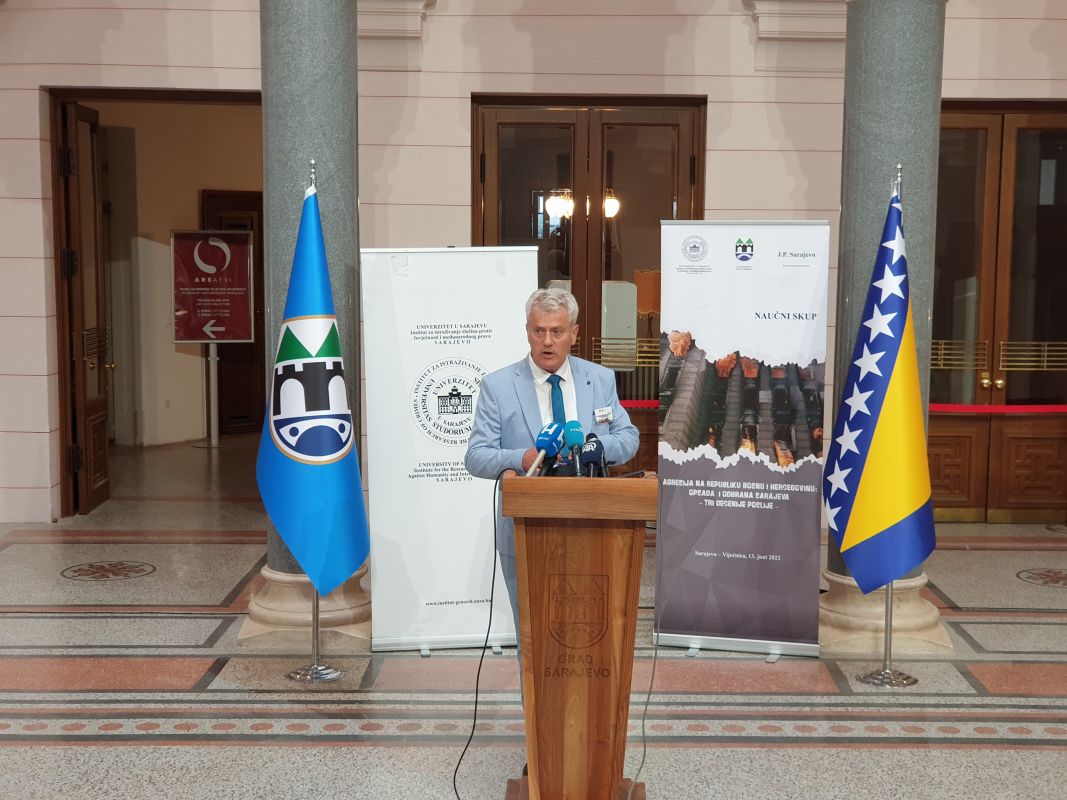The scientific meeting was organized by the Institute for Research of Crimes Against Humanity and International Law of the University of Sarajevo and the City of Sarajevo. The patron of this meeting was the Mayor of the City of Sarajevo, Assoc. Ph.D. Benjamina Karić.
On that occasion, the director of the Institute for Research of Crimes Against Humanity and International Law of the University of Sarajevo, prof. Ph.D. Rasim Muratović said that 30 years have passed since the beginning of the siege and defense of Sarajevo.
According to the Greater Serbia strategic plan, Sarajevo was the epicenter and main target of the aggression.
According to all objective analyzes and expert military assessments, Sarajevo should have fallen in a few days. It turned out that Sarajevo was defended and defended, as a city under siege, for the longest time in the history of modern warfare, for hundreds of days longer than the historical defense of Leningrad.
However, as the bestial siege and the unprecedented destruction and destruction of Sarajevo's civilizational fabric continued, the political and symbolic importance of Sarajevo's defense grew.
It was a defense that was organized from the feeling of existential threat, the feeling of "to be or not to be", the historical salvation of the state and people.
With that, Sarajevo sent a message that it was Europe even when Europe turned its back on it, allowing its medieval siege of almost four years on the threshold of the XXI century.
The fate of Sarajevo is tied to the fate of Bosnia and Herzegovina as a sovereign and internationally recognized state and vice versa.
That is why the future belongs to Sarajevo.
The mayor of Sarajevo, Benjamina Karić, emphasized that in Sarajevo, Europe was being defended, a Europe of equal citizens, a Europe of state and local authorities that will be responsible and in the service of man. So far, a lot has been said about the siege of Sarajevo, as a phenomenon, as a collective experience, as a heavy burden carried by this city and its citizens. What the Army of the Republic of Bosnia and Herzegovina achieved in the dramatic nineties should be and remain a permanent testimony and historical lesson to us and future generations about unshakable courage, self-sacrifice and patriotic devotion to their city and their country. They wrote the most honorable pages in the existence of Bosnia and Herzegovina.
Rector of the University of Sarajevo, prof. Ph.D. Rifat Škrijelj said that the University of Sarajevo and the City of Sarajevo are symbols of Bosnia and Herzegovina at the international level. The city of Sarajevo as the capital of Bosnia and Herzegovina, and UNSA as the oldest and largest University, the cradle of all public universities in Sarajevo.
The University of Sarajevo as an institution did not stop its work for a single day because of the aggression against Bosnia and Herzegovina. Although some faculties were completely burned down. A large number of students and professors were members of the Army of the Republic of Bosnia and Herzegovina. This is what will make UNSA throughout history an indestructible institution that testifies to the heroism of its members, students, academic community and non-teaching staff who have woven their lives into the foundations of Bosnia and Herzegovina.
As part of the scientific meeting, the panels "The role and importance of the Presidency of the Republic of Bosnia and Herzegovina in the resistance and defense of Bosnia and Herzegovina", "Aggression against the Republic of Bosnia and Herzegovina, the role and importance of the Army of the Republic of Bosnia and Herzegovina in the resistance and defense of Bosnia and Herzegovina" and "Siege of Sarajevo, crimes committed in 1992-1995. and responsibility for crimes", "The role and activity of the media in Sarajevo under siege".
Presentations were given by: academician, prof. Ph.D. Mirko Pejanović, Jakob Finci, prof. Ph.D. Franjo Topić, prof. Mustafa Spahić, Rajko Živković, Dervo Sejdić, Fikret Grabovica, assistant. Ph.D. Vahid Karavelić, prof. Ph.D. Nedžad Ajnadžić, Mustafa Polutak, M.Sc. Zijad Rujanac, M.Sc. Neziran Đogo, Ph.D. Meldijana Arnaut-Haseljić, academician, prof. Ph.D. Džemal Najetović, prof. Ph.D. Izet Šabotić, Ph.D. Mesud Šadinlija, Assoc. Ph.D. Ermin Kuka, M.Sc. Almir Grabovica, prof. Ph.D. Sead Selimović, Ph.D. Zilha Mastalić-Košuta, prof. Ph.D. Ismet Alija, Ph.D. Muamer Džananović, Ph.D. Hikmet Karčić, Ph.D. Merisa Karović-Babić, prof. Ph.D. Alija Kožljak and M.Sc. Sead Bandzovic.
.jpg)
.jpg)
.jpg)
.jpg)
.jpg)
.jpg)
.jpg)
.jpg)
.jpg)
.jpg)
.jpg)
.jpg)
.jpg)
.jpg)
.jpg)
.jpg)
.jpg)
.jpg)
.jpg)
.jpg)
.jpg)
.jpg)
.jpg)
.jpg)
.jpg)
.jpg)
.jpg)
.jpg)
.jpg)
.jpg)
.jpg)
.jpg)
.jpg)
.jpg)
.jpg)
.jpg)
.jpg)
.jpg)
.jpg)
.jpg)
.jpg)
.jpg)
.jpg)
.jpg)
